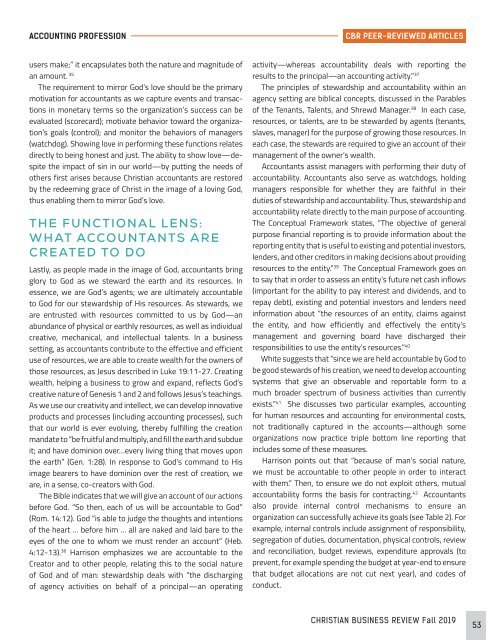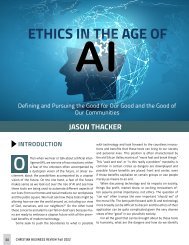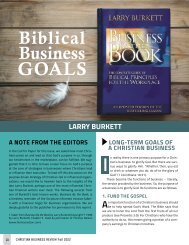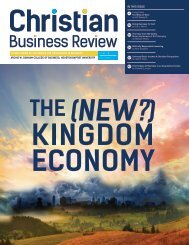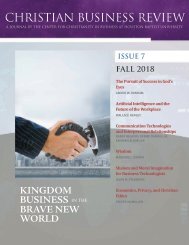Christian Business Review 2019: Workplace Practices That Glorify God (Issue 8)
You also want an ePaper? Increase the reach of your titles
YUMPU automatically turns print PDFs into web optimized ePapers that Google loves.
ACCOUNTING PROFESSION<br />
CBR PEER-REVIEWED ARTICLES<br />
users make;” it encapsulates both the nature and magnitude of<br />
an amount. 35<br />
The requirement to mirror <strong>God</strong>’s love should be the primary<br />
motivation for accountants as we capture events and transactions<br />
in monetary terms so the organization’s success can be<br />
evaluated (scorecard); motivate behavior toward the organization’s<br />
goals (control); and monitor the behaviors of managers<br />
(watchdog). Showing love in performing these functions relates<br />
directly to being honest and just. The ability to show love—despite<br />
the impact of sin in our world—by putting the needs of<br />
others first arises because <strong>Christian</strong> accountants are restored<br />
by the redeeming grace of Christ in the image of a loving <strong>God</strong>,<br />
thus enabling them to mirror <strong>God</strong>’s love.<br />
THE FUNCTIONAL LENS:<br />
WHAT ACCOUNTANTS ARE<br />
CREATED TO DO<br />
Lastly, as people made in the image of <strong>God</strong>, accountants bring<br />
glory to <strong>God</strong> as we steward the earth and its resources. In<br />
essence, we are <strong>God</strong>’s agents; we are ultimately accountable<br />
to <strong>God</strong> for our stewardship of His resources. As stewards, we<br />
are entrusted with resources committed to us by <strong>God</strong>—an<br />
abundance of physical or earthly resources, as well as individual<br />
creative, mechanical, and intellectual talents. In a business<br />
setting, as accountants contribute to the effective and efficient<br />
use of resources, we are able to create wealth for the owners of<br />
those resources, as Jesus described in Luke 19:11-27. Creating<br />
wealth, helping a business to grow and expand, reflects <strong>God</strong>’s<br />
creative nature of Genesis 1 and 2 and follows Jesus’s teachings.<br />
As we use our creativity and intellect, we can develop innovative<br />
products and processes (including accounting processes), such<br />
that our world is ever evolving, thereby fulfilling the creation<br />
mandate to “be fruitful and multiply, and fill the earth and subdue<br />
it; and have dominion over…every living thing that moves upon<br />
the earth” (Gen. 1:28). In response to <strong>God</strong>’s command to His<br />
image bearers to have dominion over the rest of creation, we<br />
are, in a sense, co-creators with <strong>God</strong>.<br />
The Bible indicates that we will give an account of our actions<br />
before <strong>God</strong>. “So then, each of us will be accountable to <strong>God</strong>”<br />
(Rom. 14:12). <strong>God</strong> “is able to judge the thoughts and intentions<br />
of the heart … before him … all are naked and laid bare to the<br />
eyes of the one to whom we must render an account” (Heb.<br />
4:12-13). 36 Harrison emphasizes we are accountable to the<br />
Creator and to other people, relating this to the social nature<br />
of <strong>God</strong> and of man: stewardship deals with “the discharging<br />
of agency activities on behalf of a principal—an operating<br />
activity—whereas accountability deals with reporting the<br />
results to the principal—an accounting activity.” 37<br />
The principles of stewardship and accountability within an<br />
agency setting are biblical concepts, discussed in the Parables<br />
of the Tenants, Talents, and Shrewd Manager. 38 In each case,<br />
resources, or talents, are to be stewarded by agents (tenants,<br />
slaves, manager) for the purpose of growing those resources. In<br />
each case, the stewards are required to give an account of their<br />
management of the owner’s wealth.<br />
Accountants assist managers with performing their duty of<br />
accountability. Accountants also serve as watchdogs, holding<br />
managers responsible for whether they are faithful in their<br />
duties of stewardship and accountability. Thus, stewardship and<br />
accountability relate directly to the main purpose of accounting.<br />
The Conceptual Framework states, “The objective of general<br />
purpose financial reporting is to provide information about the<br />
reporting entity that is useful to existing and potential investors,<br />
lenders, and other creditors in making decisions about providing<br />
resources to the entity.” 39 The Conceptual Framework goes on<br />
to say that in order to assess an entity’s future net cash inflows<br />
(important for the ability to pay interest and dividends, and to<br />
repay debt), existing and potential investors and lenders need<br />
information about “the resources of an entity, claims against<br />
the entity, and how efficiently and effectively the entity’s<br />
management and governing board have discharged their<br />
responsibilities to use the entity’s resources.” 40<br />
White suggests that “since we are held accountable by <strong>God</strong> to<br />
be good stewards of his creation, we need to develop accounting<br />
systems that give an observable and reportable form to a<br />
much broader spectrum of business activities than currently<br />
exists.” 41 She discusses two particular examples, accounting<br />
for human resources and accounting for environmental costs,<br />
not traditionally captured in the accounts—although some<br />
organizations now practice triple bottom line reporting that<br />
includes some of these measures.<br />
Harrison points out that “because of man’s social nature,<br />
we must be accountable to other people in order to interact<br />
with them.” Then, to ensure we do not exploit others, mutual<br />
accountability forms the basis for contracting. 42 Accountants<br />
also provide internal control mechanisms to ensure an<br />
organization can successfully achieve its goals (see Table 2). For<br />
example, internal controls include assignment of responsibility,<br />
segregation of duties, documentation, physical controls, review<br />
and reconciliation, budget reviews, expenditure approvals (to<br />
prevent, for example spending the budget at year-end to ensure<br />
that budget allocations are not cut next year), and codes of<br />
conduct.<br />
CHRISTIAN BUSINESS REVIEW Fall <strong>2019</strong><br />
53 2


